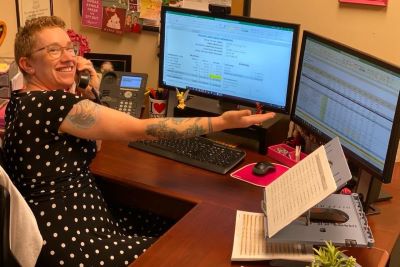Data Points at Your Fingertips
 Have you ever gotten an unexpected data request from your vice president or another university leader and your fight, flight or freeze response kicks in? Do you have to stop what you are doing and start running reports? Maybe it’s one you don’t access very often, so you have to remember how to run it? Maybe it’s something you don’t have on hand because it’s administered by a campus partner BUT you can’t tell this person to call someone else. If this has happened to you, consider tracking some basic data points to be prepared; not only will it save you time and lessen your anxiety, but it will make you look like a rock star!
Have you ever gotten an unexpected data request from your vice president or another university leader and your fight, flight or freeze response kicks in? Do you have to stop what you are doing and start running reports? Maybe it’s one you don’t access very often, so you have to remember how to run it? Maybe it’s something you don’t have on hand because it’s administered by a campus partner BUT you can’t tell this person to call someone else. If this has happened to you, consider tracking some basic data points to be prepared; not only will it save you time and lessen your anxiety, but it will make you look like a rock star!
First and foremost, basic card production figures. How many active cards are in your system on a given date? Choose a consistent day/date to run this figure, so that your data is comparable.
How many cards did you produce in the last month? Or maybe you are being asked how many cards were produced during a recess, during the remote learning of 2020, or over the course of the summer as you prepare for new students. Running this monthly will allow you to grab those figures at a moment’s notice.
Maybe you are being asked how many times cards were swiped last month for:
- Vending
- Bookstore
- Dining Purchases
- Meals
- Printing + Copying
- Library Access
- Post Office
And just like the point above, you may never know why they are looking or for what time period, so it’s best to run them monthly and have them at the ready.
Next, consider some basic data around your declining balance account(s).How many active accounts were carrying a balance in a given month? What was the monthly spend? What was the total declining balance carried in a given month?
Another area of interest to leadership is financial - you should be aware of both your expenses and revenue. For expenses, what are your monthly commission and income, if applicable? Do you have income from various fees or charges? What about your campus subsidy or allocated departmental budget?
How are you utilizing your funds? Track both your personnel and non-personnel expenses, as well as how your actual expenses stack up against what was budgeted. This information will allow you to calculate your Net Income (Revenue minus Expenses) as well as your Profit Margin (Net Income divided by Revenue).
In our department, we have tracked our lifetime (well, at least since FY12) credit card vs. ACH deposits, and declining balance spend and holding balance. The credit cards vs. ACH data has allowed us to see the change in customer deposit habits, as well as how credit card processing fees are affecting our bottom line. Additionally, we track our daily deposits as part of our reconciliation processes, and each month we detail the quantity, total dollar amount and average deposits for cash, ACH, credit cards and payroll deduction.
One unique data point that we track over the summer is the number of cards produced vs. the number of students enrolled in the specific program.As we encourage all programs to promote photo upload (and have required it since March 2020) to their new students, this allows our leadership to see just how many students are complying and where we have gaps.
As I write this, I recognized some additional data points that my department should consider tracking and analyzing. First, we need to ensure that we are rolling up all daily and monthly data into annual reports. We should also request (or have access to) some basic data from our partners in Security Systems and Dining Services, so we are not faced with the possibility of directing that campus leader to a different department. Finally, we need to track trends in deposits, swipes, spend, carry balance, and card production. All of these points will help to expand upon the story that our data is attempting to tell.
If you want to take on this adventure, I’d be happy to share my reporting templates and tracking worksheets, so that you too can experience the joy of card related and departmental financial data! You can reach me at kim.pfeffer@emory.edu.
Kim Pfeffer is a first-term member of the NACCU Board of Directors. She serves as director of EmoryCard at Emory University since 2018, and has over 20 years higher education experience.
